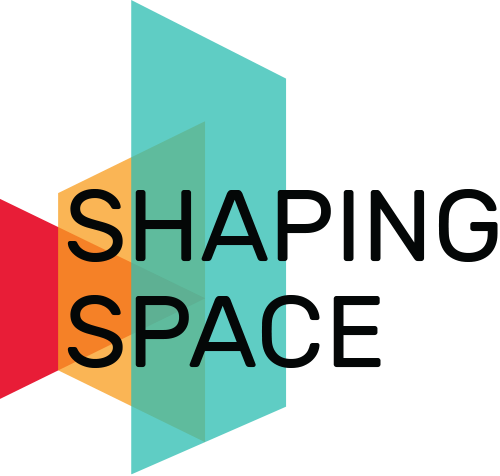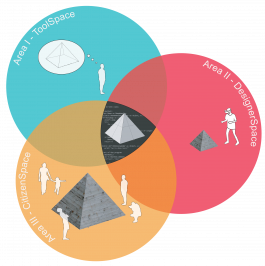


The research program of the proposed Einstein Center SHAPING SPACE is conceived through a structure addressing ToolSpace, DesignerSpace and CitizenSpace as three research areas. Each of these areas is related to a different sphere of interaction, with respect to the practice of design itself as well as to the academic disciplines involved. The results, however, feed into each other in order to achieve the Center’s research objectives.
ToolSpace is concerned with the development of new digital and hybrid design tools to be used for design space exploration. New interfaces and modalities of interaction will facilitate greater intuition and immediacy in the use of hybrid design tools. Computational support based on the integration of numerical solutions for different physical domains, and displays providing an immediate sensory impression of different points in the design space, will not only allow for a convergence of design knowing and engineering skills, but open up the process to forms of co-production, intervention and participation. Based on these tools we expect new workflows and changes in the social and aesthetic landscape of spatial design and spatial experience.
DesignerSpace will provide both a technical infrastructure (created in ToolSpace) and a physical environment, with three laboratories for mixed reality design, for digital fabrication and for architectural psychology, in which artists, designers and engineers can explore new tools and new workflows for spatial design. In these laboratories, we will investigate the affordances of different, physical, virtual, or hybrid representations of space as well as the perceptual qualities and the cognitive processes involved. We will investigate the impact of these representations on the kinds of thinking and reasoning they trigger, and what these tools should incorporate in order to support specific ‘milieus of reflection.’
CitizenSpace will investigate the co-constitution between the maker, the tool and the user. We will analyze not only the professional use of digital design tools in architectural offices within a Berlin network of cooperation partners, but also the subversive and creative uses of digital design tools outside professional design and engineering offices, in order to understand how these tools are appropriated by different actors. We will establish the Hybrid Pavilion as a living lab for exhibition and participation, and investigate how participatory design structures and digital urban infrastructures may raise an awareness for value-sensitive spatial design and facilitate more prudent and responsive decisions regarding sustainable architecture.
The vision of SHAPING SPACE is to create a center in which not only some of the most renowned artists, scientists and engineers of UdK Berlin and TU Berlin develop new approaches to the design of human habitats, but that we also become an academic partner to the large number of architecture and design offices that have made Berlin a centre for creative industries in recent years.

Prof. Dr. Sabine Ammon (Speaker)
Knowledge Dynamics and Sustainability in the Technological Sciences
TU Berlin
Marchstraße 23 10587 Berlin
Phone: +49 (0)30 314-73363
E-Mail: ammon@tu-berlin.de
Prof. Dr.-Ing. Christoph Gengnagel (Speaker)
Structural Design and Engineering
UdK Berlin
Hardenbergstr. 33 10623 Berlin
Phone: +49 (0)30 3185-2991
E-Mail: gengnagel@udk-berlin.de
Prof. Dr. Stefan Weinzierl (Speaker)
Audio Communication Group
TU Berlin
Einsteinufer 17 10587 Berlin
Phone: +49 (0)30 314-25359
E-Mail: stefan.weinzierl@tu-berlin.de

